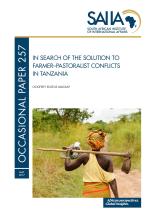Land Library
Welcome to the Land Portal Library. Explore our vast collection of open-access resources (over 74,000) including reports, journal articles, research papers, peer-reviewed publications, legal documents, videos and much more.
/ library resources
Showing items 1 through 9 of 2043.The ‘war on drugs’ has failed.
In this paper the author takes a ‘political settlements’ approach to examining the political effects of corporate social responsibility (CSR) in developing countries.
Most of the land in sub-Saharan Africa is governed under various forms of customary tenure. Over the past three decades a quiet paradigm shift has been taking place transforming the way such landl is governed.
This paper examines such interactions between industrial plantations and hydropower projects, demonstrating that it is the diverse livelihoods of local people – based on everyday use of multiple resources – that crucially connects aquatic and terrestrial environments.
This paper explores the divergent processes of agrarian transition in Cambodia and Vietnam and the ways in which they intersect through flows across the border, arguing that it is not possible to understand current processes of agrarian change in Cambodia without being attentive to agrarian histo
Land area of 3131.5451 hectares in Ou Chum district, Ratanakiri province has downsized from Forest Cover 2002 and reclassified as “State Private Land” for granting purpose as communal ownership to 4 Krung indigenous communities in Puy commune, Ou Chum district, Rattanakiri province.
Land-use conflict is not a new phenomenon for pastoralists and farmers in Tanzania with murders, the killing of livestock and the loss of property as a consequence of this conflict featuring in the news for many years n
The 55.3 hectares of land from forest cover 2002 located in Chek Dei village, Andoung Trabek commune, Romeas Hek district, Svay Rieng province was privatized for social land concession to allocate to families of military and police.
Land is one of the terrains of struggle for most rural women in Africa because of its importance in sustaining rural livelihoods, and social-cultural and geopolitical factors that hinder women from enjoying land rights.




